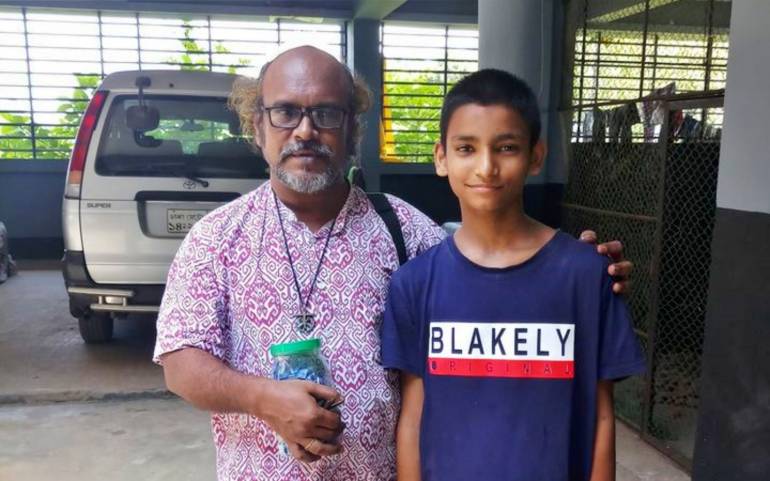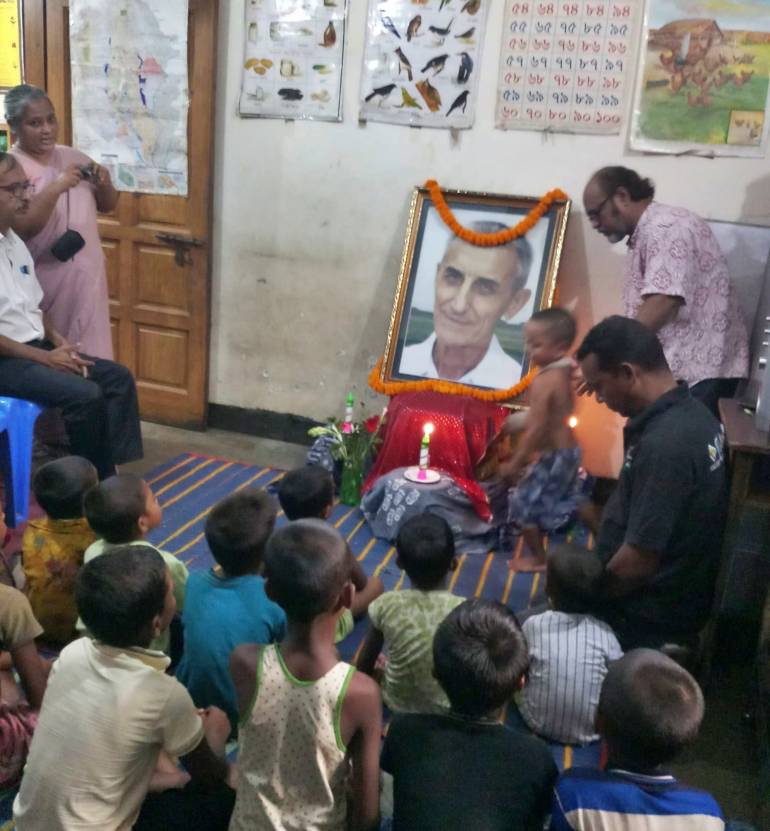Catholic-run de-addiction center cares for ‘prodigal sons and daughters’ in Bangladesh

A teenage boy from the Jashore district in the southwestern region of Bangladesh returned home last September after spending one and a half years at the Catholic-run de-addiction center to turn over a new leaf in his life.
Nayon Moni, 13, wants to study and build his life better.
In 2019, at the age of ten, he came to Dhaka by train from a remote district to collect money for drugs. His father and two other brothers are known as drug addicts in his area as well.
One year and four months ago, he was intoxicated on the way to Dhaka. He came to the city to collect some money in anger at his father, Moni said.
In a few days in Dhaka, he entered the world of addiction.
It is good that the staff of the Bangladesh Rehabilitation and Assistance Center for Addicts (BARACA) was able to rescue him and help him change his life, Holy Cross Brother Nirmal Francis Gomes, director of the center, told RVA News.
"Our outreach team found him on the streets as an addict," Gomes said.
Moni’s new identity began to spring from there—a new self-creation by him with the guidance, support, and care of BARACA staff.
"Thank God that BARACA staff rescued me and enabled me to reinvent myself through the rehabilitation program," said Moni. "I wish to be healthy by making myself a responsible person."
Moni expressed his gratitude to Brother Gomes and the BARACA staff for providing him with the needed treatment, accommodation, food, clothes, primary education, learning handiwork, and values for life.
"BARACA confirmed that I am completely drug-free," Moni said.
Last September, he expressed the desire to return home and requested that his family be contacted. His address was found by BARACA staff upon his request. On September 21, 2022, Moni returned home.
"Moni was so happy to go back home," said Gomes.
The boy’s father came from a distant district and took his lost son to his home in drug-free condition.
When asked, "What will he do when he gets home?" Moni’s reply was, "I will be addiction-free, and I will do what my parents want—study and build my future."
"I thank God from the depths of my heart for His ‘resurrected life," Moni said.
"May your healthy life and new life be beautiful. Stay well forever. May God bless you always," Gomes told Moni on his last day at BARACA.
According to Gomes, like Moni and many others can have a "new life" at BARACA due to the generosity of many. "We will succeed in our efforts to resurrect such precious lives. May God protect and guide all drug addicts in the country," said Gomes.

Holy Cross Brother Ronald Drahozal, an American missionary in Bangladesh, established BARACA in 1988. It is the country's first drug treatment and rehabilitation center. It is now a key project for Caritas Bangladesh, the social action and development wing of the Catholic Bishops.
The center provides services for the treatment and rehabilitation of drug-addicted people. It creates awareness about drugs and risk reduction, offers voluntary counseling and testing, and operates daycares and night shelters for at-risk street children.
BARACA's four centers have cured over 5,000 people and housed over 1,500 street children over the years.
In Bangladesh, there are 7.5 to 8 million drug addicts, with 48 percent of them being educated. The majority of those imprisoned are drug traffickers or dealers. Eighty percent of drug addicts are under the age of 25, and 57 percent are sexual offenders.
BARACA is making a significant difference in the lives of thousands of drug addicts. Its current recovery rate is around 38%, which is the highest in the country.
BARCA has been a Caritas Bangladesh project for the past three years. The Government of Bangladesh has recognized BARACA for providing the best service in the drug rehabilitation sector.
In June 2022, BARACA secured second place as the best organization for exemplary activities of drug addiction treatment and rehabilitation under the Ministry of Home Affairs of the People's Republic of Bangladesh.
Other activities of BARACA include awareness campaigns, networking among drug-addiction treatment centers, running a drop-in center in Dhaka, vocational training, and activities to prevent HIV and AIDS as well as sexually transmitted diseases (STDs).
At present, BARACA has 18 children and adults—31 males and 11 females.
When asked why rehabilitating them is important, Gomes stated, "Street children will give birth and grow into street children. Addicts will breed more addicts. Social security will be jeopardized."
He explained that they needed to be resurrected from this dead life

BARACA faces several challenges, including a lack of social and positive attitudes toward addicts in the society. There is almost no financial support for rehabilitation centers. Their families are not able to pay.
"We lack skilled manpower in this field and face restrictions and difficult laws from the government," Gomes added.
The Catholic Church runs two centers—APON and BARACA. Both were founded by Holy Cross Brother Ronald Drahuzal.
Gomes is the director for both. APON is supported by the Brothers of Holy Cross and BARACA through Caritas Bangladesh.
BARACA has five drop-in centers in many parts of the country. It has more than 110 employees.
Though it receives some limited financial support from the government, it is insufficient.
"I do not manage the centers; God arranges and manages everything," Gomes said. "Believe and hope that things will be possible."
Radio Veritas Asia (RVA), a media platform of the Catholic Church, aims to share Christ. RVA started in 1969 as a continental Catholic radio station to serve Asian countries in their respective local language, thus earning the tag “the Voice of Asian Christianity.” Responding to the emerging context, RVA embraced media platforms to connect with the global Asian audience via its 21 language websites and various social media platforms.














